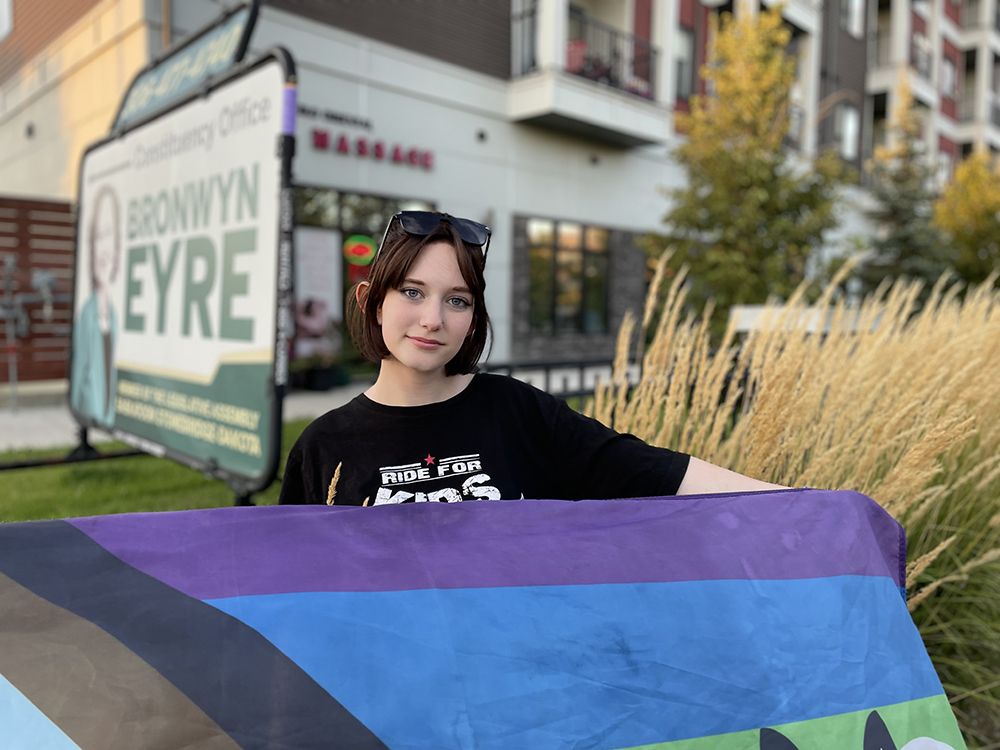
REGINA — As summer vacation comes to an end, 14-year-old Bu Wells-MacInnis is one of thousands of students across Saskatchewan heading back to class this week — but her biggest concerns aren’t about new subjects, tough teachers or getting to homeroom on time.
She’s a lot more worried about whether all of her friends are going to be safe this year, at school and at home.
Thinking back to last autumn, Wells-MacInnis has vivid memories of the day her teacher told her class about a new law the provincial government had just passed — Bill 137.
The law said if students under the age of 16 want to change what “gender-related” name or pronouns they use at school, they would need to tell their parents and get their consent first.
If the school thought it was “reasonably expected that obtaining parental consent … is likely to result in physical, mental or emotional harm to the pupil,” educators’ only option would be to work with the student to make a plan for how to talk to their parents or guardians about it.
The bill also banned sex educators from coming into schools and doing class presentations, and said that no legal action could be brought against the government for any harm resulting from this law.
“When my teacher sat us all down and had a talk about what this bill was — and I’m grateful to her, that she did that — a lot of my friends had terror on their faces,” said Wells-MacInnis. “I don’t even know how to describe it. It was horrible.”
Fran Forsberg, a foster parent and longtime advocate for trans and gender-diverse youth in Saskatoon, says children — especially children whose parents wouldn’t accept them if they came out as transgender, or wanted to try a different name or pronouns — need more safe, caring and supportive adults they can turn to, and this Saskatchewan Party bill has left them with fewer.
“Not every child has a supportive home,” said Forsberg. “And even when they do, a lot of kids come out to a teacher first. This Bill 137 has tied teachers’ hands to address this.
“I want the government to realize that self-harm goes down at least 85 per cent when children are supported. Are these children’s lives not worth anything to this government?” Since the bill passed last October, Wells-macinnis says bigots and bullies have gotten bolder.
“It’s heartbreaking to see the government abuse their power and endanger youth like this,” she said at a rally outside of MLA Bronwyn Eyre’s office on Thursday evening. “Obviously, there has always been homophobia and transphobia, but in the past year it got worse. It’s more direct and it’s more targeted.”
Eyre did not respond to a request for comment before Monday afternoon.
But for Lia Storey-Gamble, who also attended Thursday’s rally, Bill 137 inspired a different kind of boldness: After the law passed, Storey-gamble decided to challenge it at the ballot box and in the boardroom. They are currently running for school board trustee in Saskatoon.
“Bill 137 is an insult to the principles of inclusion, respect and dignity — principles that public education should be following; principles that make us all stronger,” said Storey-Gamble. “We know a child’s ability to succeed in school is directly linked to feeling safe. Our schools need to be safe for students to be themselves.”
As legal challenges to Bill 137 continue to make their way through the courts, Wells-MacInnis says she and her classmates have all spent time this summer thinking about how these rules will affect their lives this school year.
“I’ve noticed that people think, ‘Oh, it’s just a couple of kids that are affected by this,’ but that’s honestly not what I’ve witnessed firsthand,” she said. “This is not just about a couple kids in the classroom who are identifying this way: It’s not just their problem.
“It affects all of us. It affects the kids. It affects the parents. It affects the teachers, which I think is just crazily unfair. It affects everyone in our community.”